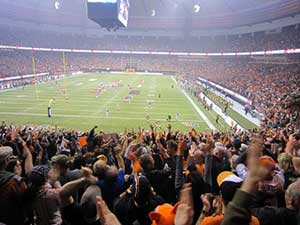
How much do the BC Lions pay to play at BC Place Stadium, which was opened in 1983 and renovated in 2011 to the tune of a half-billion dollars for their benefit?
Major League Soccer's Vancouver Whitecaps play there, too. It's also home to winter and spring trade shows, a monster truck show and the occasional rave and big-ticket concert. But the 60-year-old Canadian Football League franchise is the longest-serving anchor tenant at the downtown venue.
The Lions play on a pricey stage that continues to cost taxpayers. BC Place's publicly owned stadium operator B.C. Pavilion Corporation (PavCo) will likely lose more than $24 million this year. So it would seem in the public interest to know how much the star tenant pays against such revenue shortfalls.
But the quest to find out the financial terms of the Lions' contract with PavCo is almost three years old and may not be solved before the Lions attempt to win their seventh Grey Cup on Nov. 30.
A July 21, 2011-filed Freedom of Information request was thought to be settled when an adjudicator ruled Feb. 24 of this year that PavCo must disclose the full contract by April 7. Vaughan Barrett didn't buy PavCo's claim that the Crown corporation would suffer financially if the public knew the dollar figures; he labelled PavCo's argument speculative. But the Lions complained because they said PavCo failed to consult them before Barrett's inquiry.
The Lions believe what they pay is a trade secret, despite effectively holding a monopoly to play at a venue that is itself a monopoly. The club has territorial rights to professional football and BC Place is the only permanent venue with all the modern amenities west of the Rockies capable of hosting professional football. When the stadium was closed for renovations in 2010 and 2011, PavCo paid $15 million to erect a temporary stadium on the old Empire Stadium site so the Lions wouldn't be homeless.
The club filed for a judicial review in B.C. Supreme Court on April 10 before Barrett decided on May 15 to reopen the case and hear the Lions' opposition because, he believed, the Lions "would be thought to be affected by disclosure."
Lions' president Dennis Skulsky did not respond to an interview request.
Inside the contract
The 53-page agreement, dated Dec. 1, 2010, is up for renewal in 2016 and grants the Lions exclusivity to promote and produce all professional football games, including any involving the National Football League; so far, the only time that happened was in 1998 when the San Francisco 49ers beat the Seattle Seahawks in a Budweiser-sponsored exhibition game marred by numerous fights in the stands on a muggy August afternoon.
"The rent for the premises during all preseason and regular season games played at the stadium during the license term shall be the following percentages of the amount of net ticket sales for all such games during each operating year," reads the contract.
There are six steps in calculating the rent, but details for all six were censored. So is the paragraph that sets the rent structure for playoff games and the clauses about revenue from sponsorship and advertising.
Under questioning from NDP critic Shane Simpson on July 17, 2013, Todd Stone, the minister responsible for PavCo, told a budget estimates hearing that PavCo is unable to release the numbers because they're "commercially sensitive" -- both to the teams in question but also, it seems, to PavCo.
"I will say that the revenue of PavCo, as the member knows well, is detailed on a consolidated basis," Stone said. "In addition to the revenue that comes in, in the form of rent from the teams, PavCo also receives revenue in a variety of other forms. PavCo does receive a percentage of ticket sales through TicketMaster. PavCo receives revenue from food and beverages, as well as advertising."
Ontario's Information and Privacy Commissioner ruled March 5, 2013 that a similar public venue operator, Hamilton Entertainment and Convention Facilities Inc., couldn't keep secret the contracts it has with service providers and sports teams. The Hamilton entity unsuccessfully argued that disclosure would harm third-party trade secrets.
"Individuals or corporations doing business with government institutions must recognize that sometimes their business objectives are balanced with the concurrent objective of transparency in public matters," concluded the Ontario decision. "In turn, the important interest taxpayers have in knowing the terms of the agreements entered into by institutions on their behalf is acknowledged and affirmed."
It cost $126 million to construct BC Place with an air-supported fabric roof in 1983; that is $263 million in 2011 dollars. The government said it cost taxpayers another $514 million for the post-Olympics renovations, which included a new retractable roof.
Television revenue
While the B.C. citizenry poured hundreds of millions of dollars into their False Creek North venue for Canadian professional football, the economics of pro sports changed markedly. Back in 1983, box office and sponsorship were king. The 1990s saw the explosion of merchandising and advertising sales. Now, TV and Internet rights are ballooning.
The Globe and Mail reported in 2013 that TSN is paying the CFL $40 million a year for broadcast rights from 2014 to 2018 -- a whopping two-and-a-half times greater than the previous five-year deal, which was believed to be $15 million a year. Much of that is divided among the league's nine teams, including the expansion Ottawa RedBlacks.
The increased revenue did not go unnoticed by players who wanted a bigger piece of the pie. After threatening to strike, they ratified a new, five-year collective bargaining agreement last week. The CFL Players' Association wanted the salary cap increased to $6.24 million per team, but the league agreed to $5 million in the first year of the new deal. That is an improvement from the $4.4 million of 2013 when the minimum per player salary was $45,000. That rises to $50,000 this year.
All of this high-priced electronic spectacle must take place in a real world venue, and the public owned BC Place is certainly one of the most lavish in Canada.
And yet, while Metro Vancouver's population increased by a million people since the Lions left Empire Stadium in 1982, that hasn't translated to more bums in seats at BC Place.
The BC Lions business: a brief history
The Lions were owned by a community society until 1989 when flamboyant Vancouver stock promoter Murray Pezim privatized the club for $1.7 million, but Pez's Prime Sports went bankrupt in 1992. Brick furniture chain tycoon Bill Comrie took over for four years before selling to Nelson Skalbania in 1996. Skalbania owned the club for just six months before a receiver took over.
The year before he sold, Comrie was interviewed for a Nov. 29, 1995 Province story that said the Lions "don't pay rent to play in BC Place Stadium, but have no share in concessions or parking. The club is paid 50 cents for each person who attends. Owner Bill Comrie, who has accumulated three-year losses of $7.2 million, is able to write off $3 million as a tax loss."
Hamilton auto parts tycoon and former Tiger-Cats owner David Braley bought the Lions in 1997 and remains the owner. The man described as a "Burlington billionare" by Sun Media's Biz Magazine also bought the Toronto Argonauts in 2010. He has said that he plans to sell one or both of the teams by the time he turns 75 in 2016.
Braley, a Conservative senator from 2010 to 2013, brought stability to the Lions' den. He also writes donation cheques to the BC Liberals. Since 2005, he has given $67,650 to the ruling party, which okayed a $1.88 million payment from PavCo to the CFL for 2011 Grey Cup hosting rights and another $2.7 million to bring the game back to Vancouver in 2014.
While we don't know what the Lions pay to play at renovated BC Place, we do know figures for the season after the old roof famously ripped and collapsed under snow.
According to accounting records provided by a source, the Lions' percentage rent for 2007's nine regular season games and one exhibition was $160,084.93 -- an average rent payment of $16,008.49 per game. The price to play their lone home playoff game in 2007 was almost as much as the rent for the previous 10 games: PavCo charged $147,238.63 rent for the CFL West Final.
When they charged $27 to $70 for a regular season ticket in 2007, the Lions netted $7,340,156.82 in ticket sales. They weren't charged any rent for the first $6 million, but had to pay $100,000, or 10 per cent, of the next $1 million, and $51,023.52 of the next $1 million. The net percentage rent was $151,023.52, plus GST.
For the West Final, the Lions were charged $50,000 on net gate proceeds in excess of $750,000, another $25,000 on net gate proceeds in excess of $1 million and 15 per cent, or $47,238.63, of net gate proceeds in excess of $1.5 million.
The Lions' lease does not include amateur football. Last Nov. 30, the B.C. Secondary Schools Football Association hosted the Subway Bowl high school football championships for Grade 8 to 12 teams. PavCo refused to release the dollar amount paid by the non-profit organization, but The Tyee learned PavCo charged it $20,181.33.
PavCo wasn't so secretive when it came to the contract the Canadian Soccer Association signed to use the stadium for 15 days in early 2012. PavCo charged $263,200 when CONCACAF held its London 2012 Olympics women's soccer qualifying tournament at BC Place.
In 2014, the Lions are charging $33.57 per end zone seat and $114.52 for the comfy club seats, plus taxes and fees. A season ticket in the end zone is $271 and $1,050 in the comfy club seating. Tickets to the Nov. 30 Grey Cup cost $135 to $360 extra.
Last year, the Lions averaged 28,310 spectators for their nine regular season games, down 2,045 from 2012 when they were the defending champions. In 2007, when they were also coming off a Grey Cup win the previous season, attendance averaged 32,456.
The 2011 Grey Cup wasn't enough to put PavCo into the black and the 2014 game is unlikely to do the trick either. For 2012-2013, the most recent year available, PavCo reported a $13.036 million deficit at BC Place. This year's projection is a $24.345 million loss. ![]()
Read more: BC Politics















Tyee Commenting Guidelines
Comments that violate guidelines risk being deleted, and violations may result in a temporary or permanent user ban. Maintain the spirit of good conversation to stay in the discussion.
*Please note The Tyee is not a forum for spreading misinformation about COVID-19, denying its existence or minimizing its risk to public health.
Do:
Do not: